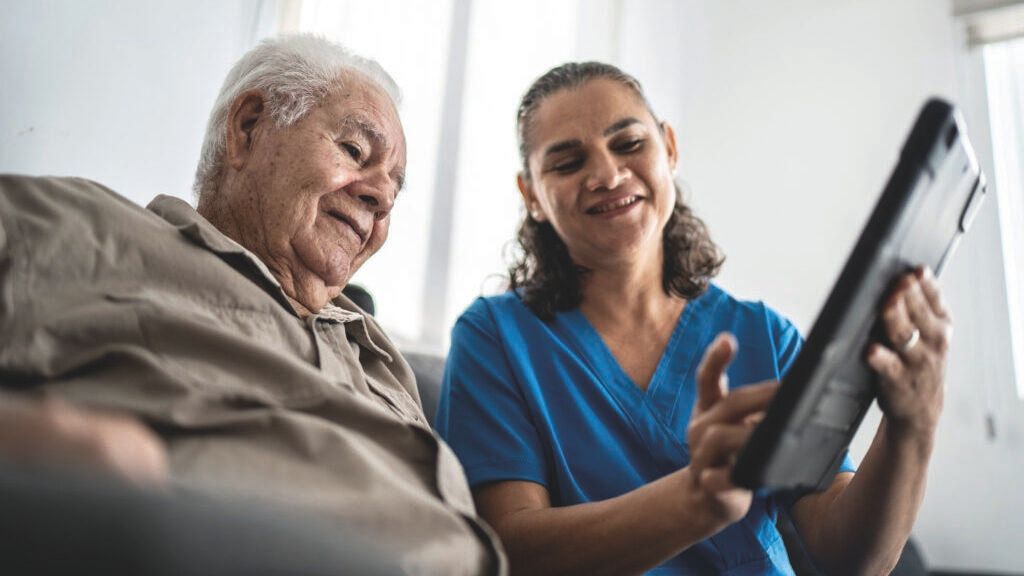How to keep your care home cool in the summer
The Met Office has issued its first extreme heat-health alert warning ahead of the heatwave – with some parts of the UK reaching 40C this week. For many people, this summer’s heatwave is a chance to enjoy the outdoors. Spending time outdoors can be beneficial for our health: it can boost your vitamin D levels, improve your focus, and lessens anxiety. However, too much heat poses a risk to our elderly loved ones, especially for those living with dementia.

Lottie’s new research has found that over the last 7 days, Google searches have surged for advice on heat exhaustion and heatstroke:
– Over 5000% increase in online searches for ‘what are the first signs of heat exhaustion’ and ‘does heat stroke cause vomiting’
– 170% increase in online searches for ‘symptoms of heat stroke’
Will Donnelly – care expert and co-founder of Lottie – has warned about the risks of the heatwave for care home residents: “A heatwave can affect anyone, however, extreme heat brings greater health risks to those over 75.
As the hot weather continues, care homes need to be taking additional safety precautions to keep care home residents cool and appropriately supported.
For example, being aware of each resident’s individual needs and how these may change during a heatwave. Hydration and nutritional requirements will change during hot temperatures. However, adjusting the food menu to include foods rich in water (cucumber, tomatoes, melons and oranges) can help to keep residents’ fluid levels up and reduce the risk of dehydration.
Similarly, it is just as important to keep a care home as cool as possible during a heatwave – this is essential to ensure the safety of residents as the temperature in the UK soars. From monitoring the temperature of the building, keeping curtains and windows closed during the day and increasing the outside shading area, there are lots of steps care homes can take to keep temperatures down”, shares Will Donnelly.
Here’s How to Keep Elderly Residents Cool During the Heatwave, According to Care Expert Will Donnelly:
Make sure drinks are easy-to-reach
Make sure they have regular cold drinks within easy reach. For instance, place a jug of fresh, cold water in every room and their usual places, including next to their favourite chair.
You may find it helpful to place any refreshments in brightly coloured glasses, so it captures their attention when they’re moving around their home.
- Offer the right foods
Dehydration is a common challenge for older people, especially for those with dementia. Fortunately, it’s not only drinks that can help you top up your fluid levels: lots of fruit and vegetables are also great sources of water.
Cucumber, tomatoes, mushrooms, melons, and oranges have lots of water, so they make the perfect snack. You could make a lovely, fresh fruit salad for you both to tuck into.
- Ensure they’re dressed appropriately
There’s a high risk of heat exhaustion or heat stroke when it’s very hot outside. To prevent any heat-related conditions, make sure to wear light-coloured, loose clothing.
If any residents living with dementia dress, they may wear their usual clothes and forget to dress for the warmer weather. The most important thing is that they feel cool and comfortable, and their risk of heatstroke will reduce.
- Find ways to cool off
A cool bath or shower works wonders for cooling people down during a heatwave. If you notice a resident is hot, move them to a cool place and gently spray them with cool water. A fan will also cool them down and ensure they stay well. Make sure you stay with them until they’re better.
- Seek support immediately
If any residents experience any signs of heat exhaustion or heat stroke, it’s important to seek support from a medical professional.
Heatstroke puts your health at risk, especially when you get older. If you or someone else has a high temperature of 40C or above, is breathing fast, and generally feels unwell, call 999. Heatstroke can be very serious if it isn’t treated quickly.




